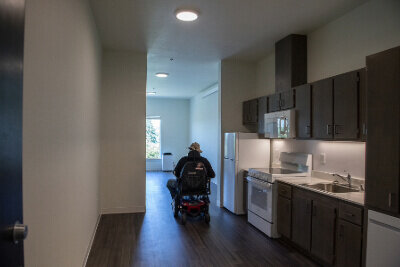
Are you interested in diversifying your real estate investments in San Antonio? Alternative housing options like college dorms, sober living homes, and low-income properties offer unique opportunities beyond traditional single-family homes and apartments.
However, these investment opportunities require a good understanding of the local market and relevant regulations. In this blog post, we will explore the advantages and challenges associated with these alternative housing types. Partnering with professional buyers like MD Realty can help you navigate these complexities and make smart, informed decisions. Whether you aim to boost your cash flow, gain tax benefits, or support community welfare, alternative housing offers various paths to meet your investment goals. Let’s examine these options to understand their potential impacts on your portfolio better.
College Housing

Investing in college housing offers several advantages. The primary benefit is the steady pool of tenants; students consistently seeking housing near their institutions ensure high occupancy rates. This demographic is less price-sensitive during their academic terms, allowing for relatively higher rental income than off-campus housing options. Financially, college dorms tend to generate more revenue during the school year, with the possibility of premium charges for less common accommodations (e.g., single rooms or units with private amenities). It can significantly increase the profitability of investments in college housing.
However, potential investors should also consider several challenges associated with college dormitories. High turnover rates are typical, with tenancies often aligning strictly with academic calendars, leading to frequent tenant changes that can incur costs related to tenant search and property upkeep. Additionally, the maintenance costs for these properties can be higher than average. Students may not maintain the premises as carefully as other tenant groups, necessitating more frequent repairs and refurbishments to keep the property attractive and functional for incoming tenants. The nature of student housing also presents unique opportunities for niche marketing and specialized services that can further enhance profitability. For instance, offering fully furnished units can attract more students who prefer to avoid purchasing their furniture. Similarly, providing all-inclusive packages that cover utilities, internet, and cleaning services can justify higher rents and increase the property’s appeal.
Investors should also be mindful of the social dynamics and operational challenges specific to college students. Implementing strict house rules regarding noise, visitors, and partying can help maintain the property’s condition and reduce tenant conflicts. Also, effective communication channels must be established to promptly address tenant concerns and repair requests, which are more frequent with student tenants. Security is another critical aspect. Investing in proper security measures such as CCTV cameras, secure entry systems, and adequate nighttime lighting can make properties more attractive to potential tenants who prioritize safety. It not only helps maintain high occupancy rates but also reduces potential liabilities.
Investors in college housing must stay informed about changes in university enrollment trends, local real estate market conditions, and national education policies, as these factors can significantly impact the demand for student housing. By keeping a finger on the pulse of these dynamics, investors can make informed decisions about when to expand, renovate, or modify their investment strategies to best capitalize on the college housing market.
Sober Living Homes

Investing in sober living homes in San Antonio can greatly impact the local community while generating revenue positively. Sober living homes offer a safe and supportive environment for people in recovery from addiction, and investing in these properties can provide a sense of fulfillment by helping people in need.
Investing in sober living homes in San Antonio presents several unique advantages. These properties generally face less competition from investors because they require a specific approach, making it easier for new entrants to establish a foothold and achieve profitability. Additionally, the nature of recovery means that residents typically stay longer than in traditional rentals, providing investors with stable occupancy rates and consistent rental income.
However, running sober living homes involves particular challenges. Investors must navigate a complex landscape of local laws and zoning regulations, which vary widely and include specifics for housing individuals in recovery. Maintaining the property’s environment is critical; strict rules must be enforced, and regular checks are necessary to ensure all residents meet sobriety requirements. These operational demands require diligent management and a proactive approach to property oversight.
Investing in sober living homes in San Antonio can be a rewarding way to impact the local community while generating revenue positively. By taking a unique approach and partnering with reputable treatment centers, you can help provide a safe and supportive environment for individuals in recovery while building a successful investment portfolio.
Low-Income Properties

While investing in low-income properties can be rewarding, knowing the challenges is essential. These properties may require more maintenance and repairs than newer, higher-end properties due to their age and the financial constraints of tenants. Additionally, there are strict legal requirements to consider, including rent control laws and fair housing regulations, which can vary widely and impact the investment’s profitability and legal standing.
The strategic location of these properties, often in revitalizing neighborhoods or areas slated for future development, can also play a crucial role in their valuation over time. Investors can capitalize on these dynamics by selecting areas with planned infrastructural improvements or those on the brink of gentrification, which likely promise appreciation in property values.
Furthermore, managing low-income properties requires a nuanced approach to tenant relations. Landlords must be particularly empathetic and responsive to maintain good relationships and minimize turnover, which can be costly. Effective property management can mitigate many potential drawbacks of investing in this sector by ensuring that the properties are well-maintained, that tenant issues are promptly addressed, and that all regulatory requirements are consistently met.
Investors should also consider the social impact of their investments. By providing quality housing in low-income areas, they contribute positively to the community and enjoy a favorable public perception, which can benefit broader business endeavors. Additionally, investing in low-income housing often qualifies investors for various tax credits, mainly if they provide subsidized housing according to federal or state programs designed to encourage such investments.
To maximize the potential of low-income property investments, savvy investors will do well to focus on long-term growth prospects, operational efficiencies, and community impact, aligning their investment strategies with both market demands and social responsibility goals. This comprehensive approach fosters a stable and profitable investment portfolio. It supports the well-being of the communities where they invest, creating a win-win scenario for investors and residents.
How MD Realty Can Help You Find the Best Deals
Partnering with professional buyers at MD Realty can help you navigate the unique challenges and considerations of investing in alternative housing types in San Antonio. Our experienced team can help you identify undervalued properties, negotiate deals, and manage properties to ensure a steady rental income stream.
Additionally, we can provide valuable insights into the local market and regulations related to alternative housing types. Our team can help you identify high-demand areas for college housing or work with reputable treatment centers for sober living homes.
Additionally, our team at MD Realty can assist you in understanding and complying with the intricate regulations governing low-income housing in San Antonio. We ensure that you stay compliant with all relevant local laws and regulations.
Investing in alternative housing types in San Antonio can provide several benefits, including high rental demand, steady income, and tax benefits. However, it’s essential to understand the unique challenges and considerations that come with these types of properties.
Partnering with professional buyers at MD Realty can provide valuable insights and resources to help you find the best deals and navigate the unique challenges of investing in alternative housing types. Contact us today to learn more about how we can help you invest in alternative housing types in San Antonio with confidence. (210) 607-9779

